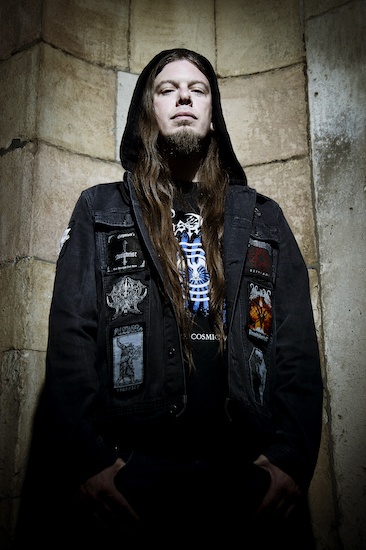
photo by Ester Segarra
(Comrade Aleks has brought us a very special interview with Dayal Patterson, the proprietor of UK-based Cult Never Dies, with a focus on the dramatically expanded second edition of his seminal 2003 book about black metal.)
There are a few books dedicated to such an important extreme music genre as black metal, and Black Metal: Evolution of the Cult is the first one you really need to know. First released almost ten years ago, it remains a key tome, answering almost any question one could have regarding all the contradictions and rumours you might hear about the blackest of arts.
Those aren’t empty words, as the book’s author Dayal Patterson performed absolutely in-depth research and managed to keep his work away from just a collection of bare facts. The book was filled with fresh interviews getting first-hand information from the bands, and from afar, it looked like fair and solid work.
It was released by Decibel back then, and now by Dayal, who already runs his own well-known publishing company Cult Never Dies. It’s not just a publishing company but “the home of metal literature, a publishing house, merchandise company, label and mail order dedicated to underground metal and cult art”.
Dayal was returned the rights to Black Metal: Evolution of the Cult, and he spent the last entire year preparing its massively reworked anniversary edition. The new edition is significantly bigger than the original one: it contains one and a half times more text, twice as many photos, and twice as many interviews. Ambitious, isn’t it?
The book is available for preorder in late November and will be dispatched shortly before release. Meanwhile, we had a great interview with Dayal, and it should be interesting to any black metal fan.
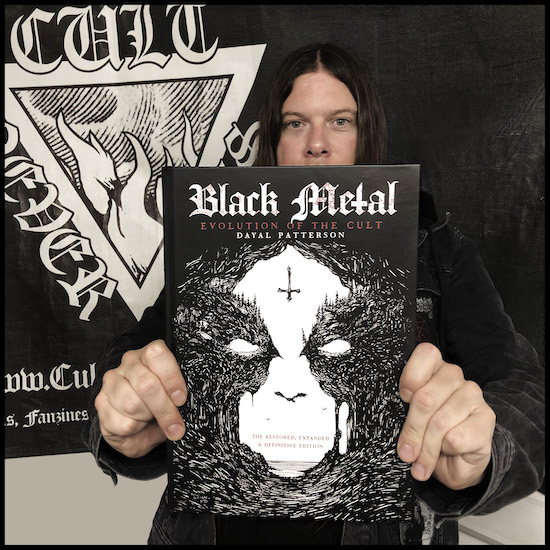
Hi Dayal! How are you? Are all preparations finished and the Black Metal: Evolution of the Cult test press good enough?
Yes I am supremely satisfied with this new edition of the book. It is how I originally imagined that the project would be manifested back when I started in 2009, i.e., a huge hardback full of black metal history and interviews!
Feral House owned the rights to Evolution of the Cult for a decade or so. How did you get your rights to the book? And how long ago did you decide to get it?
I wanted to buy back the rights to the book from the moment it was released really, before that even, because the maximum wordcount of the original meant I had to cut so much material out of the 2013 version. The tenth anniversary of the book’s release – and the tenth anniversary of the creation of Cult Never Dies, which falls on the same date – really pushed me into action, so I took a loan, bought back the rights, and began working on the new edition.
Cult Never Dies is known for its dedicated approach — this is the brand that people trust. But I think that for many readers, the first thought was like, “What’s going on? Is it just a reprint? Why should I spend my money on it?” So how did this project evolve? How did it grow from the original edition to this massively expanded tome?
You are right and I realise that a big part of promoting this book will have to be demonstrating just how different the new edition is to the original. I’ve thought that perhaps I should have given the book an entirely new name because there is so much material, not to mention that the old chapters have been rewritten. However, this book is meant to replace the 2013 book, which is no longer in print, so the title had to be similar at least.
The reason it grew to such a massively expanded tome is my own sense of ambition and perfectionism when it comes to books in general and this project in particular. I didn’t envisage that I would add so much, but once I started working on it, the whole thing became all-encompassing, and I kept working to cram in as much content as I could to make it definitive. I don’t want to do this again, so this had to be the definitive edition. There will be sequels but no more updates.
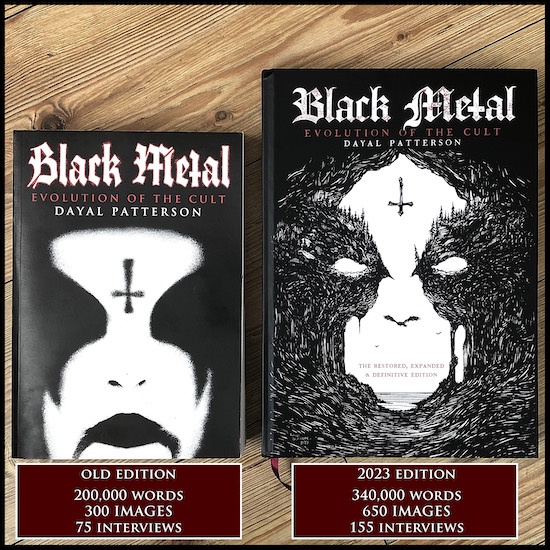
You added a lot of a new material to the book — can you reveal approximately how much? Was it both text and photos?
The original book was about 200,000 words and the new edition is about 340,000 words, so the amount of new words is actually greater than the length of your average book, almost twice as much in fact. But there is actually more new content than those numbers suggest, because I rewrote much of the preexisting 200,000 words as well. The original edition included about 70 interviews and the new one includes over 165 participants, so a lot of new conversations were conducted during the past year. And the number of images has increased massively. The original had 300 and the new book has 650.
What did you find necessary to add? Did you get some insight on the genre’s origins or evolution?
There were whole bands that were only mentioned in brief in the original book that now have a whole chapter devoted to them, including Immortal, Impaled Nazarene, Deathspell Omega, Necromantia, Satyricon, Arcturus, Absu, Profanatica, Winterfylleth, Black Witchery and more. A lot of other areas were expanded, so there’s now sizeable sections on Greek black metal, Brazil, the US, the UK, depressive black metal and so on. It’s a much more rounded picture of the development of the genre and its various offshoots.
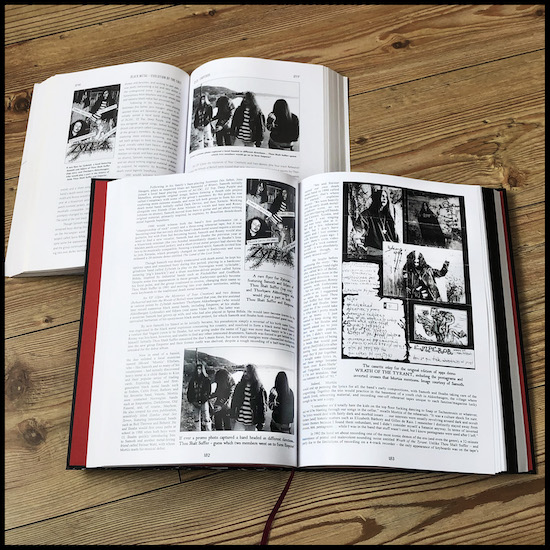
Actually, I could have prepared these questions for you earlier if we weren’t doing the interview with Magus from Necromantia; his new band The Magus is about to have the first album. There was one point among many interesting things he said which I’d like address to you as well.
Some people say that black metal lost the sense of “danger”, for which it was known in the ’90s. Also Magus said that “Black Metal was very responsive to expanding boundaries musically-compared to other metal genres — but concerning the ideology, identity and concept was ALWAYS Satanic”. What do you think? And what to do with other kinds of black metal?
That was certainly true of many bands at one time. I think most people in the scene will agree that black metal is about more than simply music, but to state that black metal must be Satanic is problematic, as it would require ruling out most key recordings, even by bands such as Burzum and Mayhem, not to mention every single release by bands such as Immortal, Thorns, Hades, Enslaved, Summoning, Drudkh, 1349, Sigh, Kampfar, Forgotten Tomb, Gaahls Wyrd, Windir, Winterfylleth, Mgła, Macabre Omen, and many more.
I think black metal certainly ought to have an anti-religious, and, for want of better words, dark/sinister/negative/challenging/misanthropic ideology, identity and concept certainly, but I think Satanism might be too narrow a term to encompass that.
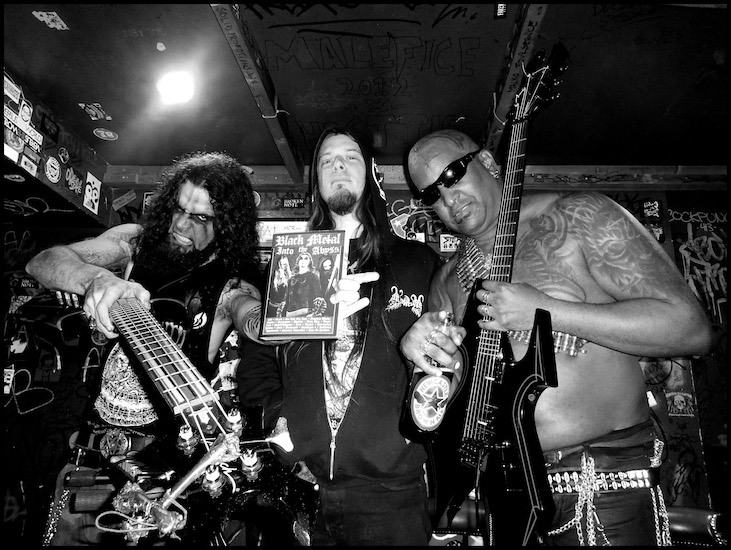
How big is the role of ideology in modern black metal? And, well, can we say that older bands are more “true and evil” regarding black metal’s original essence?
It’s not necessarily true that it’s only older bands that are closer to the essence, but it is fair to say that there are more bands claiming to be black metal that are not black metal than there ever were before. In fact, it’s not always the bands making the claims, it’s often the fans, the journalists, PR people, and so on, who are keen to make sure bands are perceived and marketed as black metal, even if they just have black metal influences (for example, Deafheaven or Alcest).
People say, “Why do you object to this band being labelled black metal?” but the real question is, “Why is it important to you that this band is labelled black metal?” And the answer is that bands and marketing teams label music as “black metal” because of the immense weight that description holds. And that weight is based on decades of controversy, culture, ideology and cutting-edge music that (paradoxically) many of these people object to. People know it is infinitely more effective than describing a band as “blackened post-hardcore” or “shoegaze with black metal inspirations”.
You mentioned that the sections about Greece, Brazil, the US and the UK were expanded. Certainly, some countries have their national black metal scenes, and sometimes these scenes really have their own features. Thanks to other black metal researchers – we have learned more about the USBM, Finnish and Hellenic black metal. Can you name a few other significant national phenomena? France? Belgium?
France would certainly be a significant one, having given the world Les Légions Noires in the early ’90s, a very effective and influential circle of bands indeed, including such great acts as Vlad Tepes, Mütiilation and Belkètre. And at the other end of the musical spectrum, groundbreaking acts such as Deathspell Omega, Blut Aus Nord and Blacklodge.
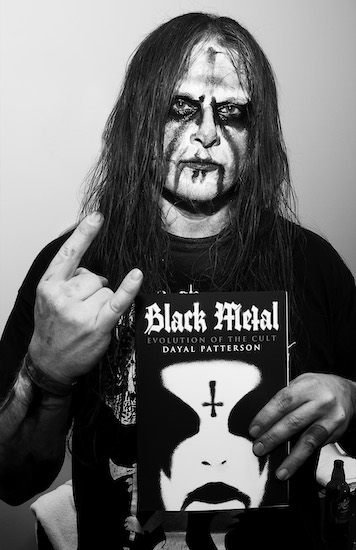
What new things did you discover working on Evolution of the Cult? You sorted everything out very accurately and precisely in the first edition – all those discrepancies and controversial questions regarding the so-called “First Wave of Black Metal” and so on. So I wonder if there were new fundamental discoveries made this time.
There’s certainly a lot of new information and quotes, even about well-mined subjects such as Euronymous and the Helvete store. I think rather than huge discoveries the new book is built up of a multitude of new details and perspectives.
For example, the Thorns chapter not only includes a few new words from Snorre Ruch but a lot of recollections from Marius Vold of his time in the band. The part of the book on Arcturus features Marius and Sverd alongside Simen and Garm. The LLN chapter has been proofed by Wlad of Vlad Tepes, with changes made for accuracy. There is a new Destruction interview in the section about mid-’80s black metal. Relating to depressive black metal, there are interviews with bands like Forgotten Tomb, Silencer, Bethlehem and so on, whereas before it was really just Shining that I looked at in detail. So the overall picture is now much more accurate, rounded and detailed I would say.
What kind of new black metal trends do you see as positive ones? And do you see a negative side effect of the genre’s popularization?
There are negatives, in the sense that the cult-like atmosphere and mystery that existed when black metal was truly underground are largely gone now. There are also a lot of “casual” black metal fans and people who have, by accident or not, attempted to co-opt and appropriate the genre in more recent times. And having a million bands trying to look like Mgła with their faces covered is probably unnecessary too. But probably the goods outweigh the bads overall.
I can’t say that any black metal trends are positive as such, but for sure it is much easier to make things happen now that the scene is larger than it was 30 years ago. Many specialist festivals, tours and even releases are only really possible because there are more people dedicated to extreme metal than there used to be.
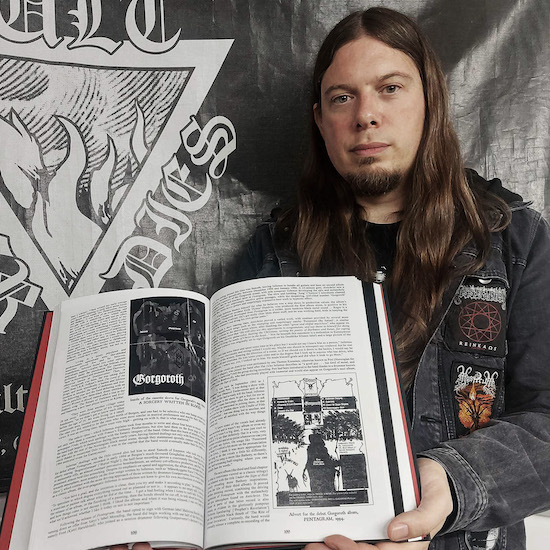
I see your point regarding Mgła, but it’s rather a more pragmatic analogue of corpse paint, isn’t it? And in the end, it works. Theatrical aspects of black metal draw fans as well. Can you name the most impressive black metal show you ever visited?
I think it worked for Mgła, but to have hundreds of bands from the same era looking exactly the same as them isn’t very effective I think. And whatever people say, there is a lot more potential for expression with corpsepaint (or no corpsepaint) than there is with faces covered in black fabric.
How many Evolution of the Cult editions do you have now? Was the human skin hardcover edition fulfilled this time?
There are only two editions in English language, and this new one is the second and last. I don’t think we will release expanded editions of our own books; the only books that we’ve expanded are the Paradise Lost biography and this book, and both were originally released by other people. No human skin I’m afraid but nice hard covers at least!
Brexit made things only more complicated for the bands and labels, and Cult is in the same boat. I don’t even mention the regression that was inflicted by the covid-plague. How do you solve these problems now? Did you find a more efficient way of distributing?
We opened an EU Cult Never Dies store a few months ago and this is helping matters. The Cult Never Dies EU store will continue to sell the core publications and musical releases, with the larger store remaining in the UK selling vinyl, fanzines, CDs and so on. We may expand the EU store eventually but this is the best way forward for now. We are also expanding our general distribution so our books will be available in more book shops, record stores and mail order.
Will the book be available in the US and South America? Or is it a better way to order it directly from you?
Absolutely! None other than the mighty Decibel are releasing the book in North America. They have created their own edition [details here] with the same content as ours, but in a slightly different format (smaller pages and therefore more of them), so this should make things much easier for readers in this part of the world. Decibel will also be distributing more of our other books. We are definitely keen to make sure those in America can access all our titles.
I think that I know the answer, but I have to ask: Did you change your attitude towards digital books?
Perhaps a little. Cult Never Dies is all about supporting print and physical media of course, but we must keep our eyes open. For the foreseeable future, books will remain print only, not least because they include so many images, and looking at pictures on a screen is not really close to seeing them in print. But I won’t go so far as to say that we will never release an ebook, because if enough people want to read about underground metal digitally, then perhaps it is churlish to ignore them forever. But I feel that this must be done very carefully to get it right.
I guess that Cult’s business model is kind of efficient… or, at least, working in the current situation. So how does it feel from inside? Do you survive? Or do you have a luxury to work in a relatively relaxed way and have some fun among the unavoidable routines?
This year was, in some ways, the hardest year for Cult Never Dies, precisely because of the new Evolution of the Cult. I basically had to put all my time, energy and money into that one project and leave the CND team to run the mail order, and so we released much less in 2023 than we ever did previously, which of course means less income.
On the other hand, we were highly active in terms of expanding, including opening the EU store and securing distribution with Decibel in the US and with Turnaround, one of the biggest book distribution companies in Europe, as well as being more involved with events and festivals. All this also required investment, so overall 2023 has been very expensive, but I think it will mean that we function more effectively as we enter our second decade of operation. I think our reputation, both as a mail order in terms of customer service, and the quality of our releases, is extremely high, and there seems to be a building demand for what we do.
Do I get to work in a relatively relaxed way? Absolutely not. I’ve never worked harder in my life. But on the other hand, I’m doing what I love doing and believe in; I’d be doing this anyway, or as much as possible, even if I had another job. So I certainly enjoy my working life and have avoided routine for a long time.
There are books telling about USBM or Finnish Black Metal history, there are biographies of Behemoth and Rotting Christ, and there are some photo books as well. What are Cult Never Dies’ plans for 2024? Do you see a chance to increase the assortment of books in your store?
There is a large backlog of projects that were delayed somewhat by the amount of time, money and energy that the new Evolution required. Over the next couple of years these will see the light of day, and this includes a new book on dungeon synth, several fanzine anthologies, the third part of our Doom Metal Lexicanum series, an art book with Christophe Moyen, a book on UK black metal, and some band biographies. So there is a lot to come, with many of these titles being well underway and even close to completion.
You released albums of Heathen Deity, and your current release is Trivax’. How comfortable and encouraging was this experience? Do you aim to have more CD releases in the future?
Yes, more CDs, cassettes and vinyl for sure. I was very happy with our releases so far, including Yoth Iria, Archaicus, Old Forest, and Stahlsarg alongside the bands you mention. This is still a somewhat new venture and again, we don’t want to rush things, we’re not trying to be a massive label or anything.
Still, I think we have a lot to offer bands – Yoth Iria and Heathen Deity sold out of all original prints for example – since we have a good reputation and can reach people that normal labels can’t, thanks to the books, etc. So we certainly wish to expand the label side of what we’re doing, but slowly, perhaps a couple of releases a year for now. I think it is important that Cult Never Dies contribute to this music and culture as well as record and document it, and the events we are involved in and music releases are two manifestations of this.
Being a black metal researcher and propagandist, didn’t you think to create your own band?
Ha! This might be misguided, but I’ve always considered that it might be a compromise somehow to get involved in playing music or being in a “proper” band. I understand that some music writers are secretly frustrated musicians, but in my case, it’s almost the opposite – I gave up playing when I became more serious and intent with the writing. There are hundreds of thousands of talented musicians, but not very many talented metal writers, so I have tried to improve my craft in that field.
That said, I’ve been playing and writing music since the mid-’90s (even played live, etc) for personal enjoyment, so it is perhaps a little daft to have these unused songs sitting around doing nothing. It would probably be healthy to do something beyond just bedroom hobby recordings – but where to find the time?
And I’m wrong person to ask such a question! Let’s finish the interview with a kind of cliché question. Can you name a few albums or new bands discovered by you during 2023 which you’d like to recommend? Top five or ten – whatever you prefer.
I’m the wrong person to ask that question! I’ve not listened to anything new in the last year – at least not in metal – because I’ve been immersed in listening to black metal from the last 40 years as part of writing this book. Perhaps instead I’ll give you a top ten of albums by bands that are interviewed in the new book that weren’t in the 2013 edition. That would work? Here it is anyway!
Destruction: Infernal Overkill (1985)
Immortal: Diabolical Fullmoon Mysticism (1992)
Mystifier: Göetia (1993)
Necromantia: Scarlet Evil Witching Black (1995)
Satyricon: Nemesis Divina (1996)
Forgotten Tomb: Love’s Burial Ground (2004)
Agalloch: Ashes Against the Grain (2006)
Profanatica: The Enemy of Virtue (2006, though material from the 90s)
Deathspell Omega: Fas – Ite, Maledicti, in Ignem Aeternum (2007)
Winterfylleth: The Divination of Antiquity (2014)
And a wildcard one for luck;
Deviser: Transmission to Chaos (1998)
Thanks for the interview, Dayal. It was good to discuss the Evolution of the Cult reissue and all these black metal matters. It’s time for the last words of immortal black metal ancient wisdom.
Thank you for your thoughtful questions Aleksey! I hope you can come and enjoy a beer with the Cult Never Dies crew in London someday soon!
PRE-ORDER NOW:
UK: https://cultneverdies.myshopify.com
Europe: https://cultneverdies-eu.travelling-merchant.com/
USA: https://store.decibelmagazine.com/collections/books/products/black-metal-evolution-of-the-cult-decibel-books-edition
https://www.cultneverdies.com/books/black-metal-evolution-of-the-cult
https://www.cultneverdies.com/

Pre-ordered this as soon as it came up from Decibel. Never read the original, so I’m really looking forward to this. Great interview!
Patterson’s original is essential and foundational. I am forever indebted to his work. I was just planning a reread; now I have something new to look forward to.
Cool interview. He is an interesting guy. I had heard of the original edition of the book but never got it. The interview says this new edition has sections now on Greek black metal (essential) and Winterfylleth (my favorite band and one I didnt expect a book on black metal to focus on). Awesome. I am going to get this.
For ordering, I see a link in the interview (this goes to Decibel), but he says this is for North and South America. Or is that the place to buy this for any part of the world? What about Europe and Asia?
Check the links at the very end of the interview. I stupidly forgot to turn them into hyper-links until just now, which WordPress makes me do manually. Anyway, those should take people where they need to go for orders outside the Americas.
Thanks, i didnt notice those links before.